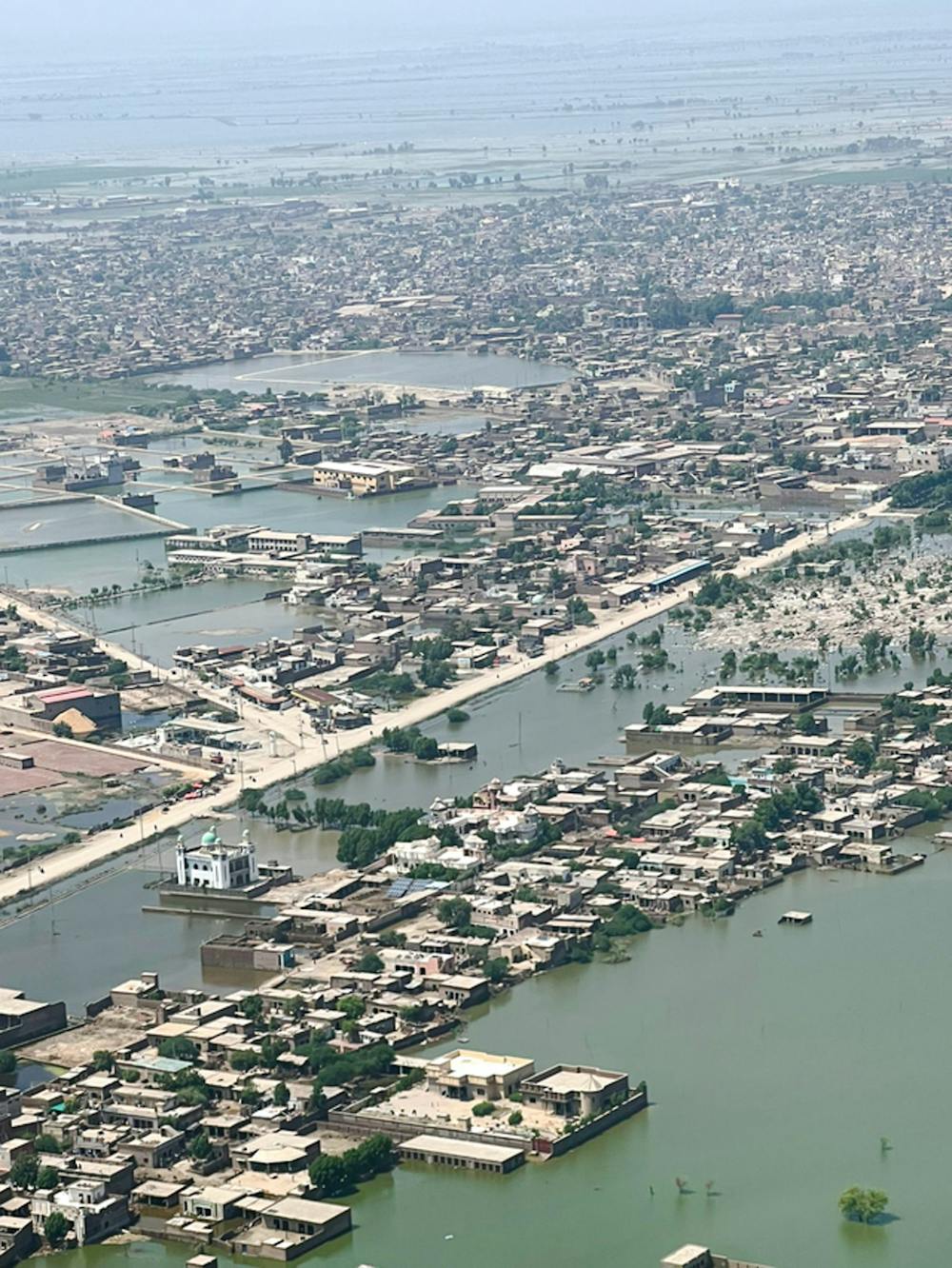After weeks of unprecedented monsoon rains that have left one-third of the country severely flooded, the Pakistani government declared a state of emergency on Aug. 26. The flooding has claimed the lives of almost 1,600 people and affected at least another 33 million.
In addition to damaging structures such homes, railways and roads, as well as livestock and crops, the floods have exposed thousands of Pakistanis to waterborne diseases that may result in a health crisis, authorities say. The country is also facing massive food shortages, with 70% of staple crops destroyed.
Mahin Ashfaq ’24 — who went to high school in Karachi, Pakistan, the largest city in the country — remembers witnessing the monsoon season in Pakistan every year. “A lot of the city’s low-lying areas get flooded, and it (always) wreaks havoc,” she said. “What was different this year was the scale at which it happened.”
Muhammad Omar Afzaal GS, a Pakistani PhD candidate in political science, was in Karachi when the flooding began.
Afzaal traveled to Pakistan in the summer before the monsoon rains started. “Toward the end of July and early August, the situation just crashed in the entire country. … I think it was the sheer pace of it that was alarming,” he said. “Four or five days later, the entire country was suffering.”
There have been “pretty severe floods in Pakistan in the past, including back in 2010,” said Adam Levine, professor of emergency medicine and health services, policy and practice and director of the Center for Human Rights and Humanitarian Studies. “But the amount of rain that was experienced and size of the area that was affected (this year) … was certainly unprecedented.”
Officials within the Pakistani government and United Nations Secretary General António Guterres have pointed out the role of climate change in contributing to extreme weather conditions.
“The difficulty is that many of the countries that are most at risk from the effects of climate change by virtue of their geographical location … are also countries that happen to be either low-income or middle-income,” Levine said.
Ashfaq and Afzaal also pointed out that it is the low-lying rural and farming areas in Pakistan that bore the major brunt of damage from the floods.
Both low- and middle-income countries, as well as the rural areas within those countries, suffer from a combination of “high vulnerability and low resilience” to natural disasters, which leads to more drastic consequences, Levine said. He added that this vulnerability can also be a result of the political structures in place to mitigate disasters.
Andrew Foster, professor of economics and director of the Social Science Research Institute, said that political instability in Pakistan has led to the mismanagement of the current crisis.
“A stable government is generally better at making plans and implementing things than governments in transition,” Foster said, citing the departure of Prime Minister Imran Khan in April as a factor contributing to government instability.
Levine pointed toward Bangladesh’s handling of the 2020 tropical cyclone as an example of preventative disaster management. “Bangladesh had set up evacuation systems where people received text message notifications in advance. They used mosques which have loudspeakers … to announce evacuation orders and set up evacuation centers on higher ground,” he said. “When a government is more dysfunctional, … it means all of these activities are not able to happen.”
Despite anticipating heavier rainfall, Haadi Iqbal ’24, another Pakistani student, mentioned that the country has been generally unprepared for flooding disasters. “What you end up seeing in a country like Pakistan is housing projects not being developed, (a lack of conducting) environmental studies … (and) not creating proper drains and channels for water to go,” Iqbal said.
As the aftermath of the flood in Pakistan unfolds, Levine believes it’s important to consider the disaster’s impact in both the short and long term. “We often think of disasters as very short term events, but that’s because the media only tends to cover them for a few weeks,” he said. “The reality is that all major disasters last for years, if not decades,” and affect a country’s development and standard of living.
In addition to short-term aid, Foster emphasized the need for long-term capital investments in Pakistan by “major banks, the International Monetary Fund, World Bank and bilateral agreements.”
For people who aren’t able to help on the ground, like much of the Brown community, “the best thing to do is find reliable places to donate,” Ashfaq said.
“What’s happening right now is clearly (a result of) climate change, and Pakistan contributes very little to global climate change,” Iqbal said. “It shows how much responsibility all of us have to reduce our emissions and be environmentally sustainable.”
Iqbal and the Pakistani Students Association are also planning a fundraiser for those affected by the floods in the coming weeks and hope to gain the Brown community’s support. “One dollar,” he said, “goes very far in a country like Pakistan."





